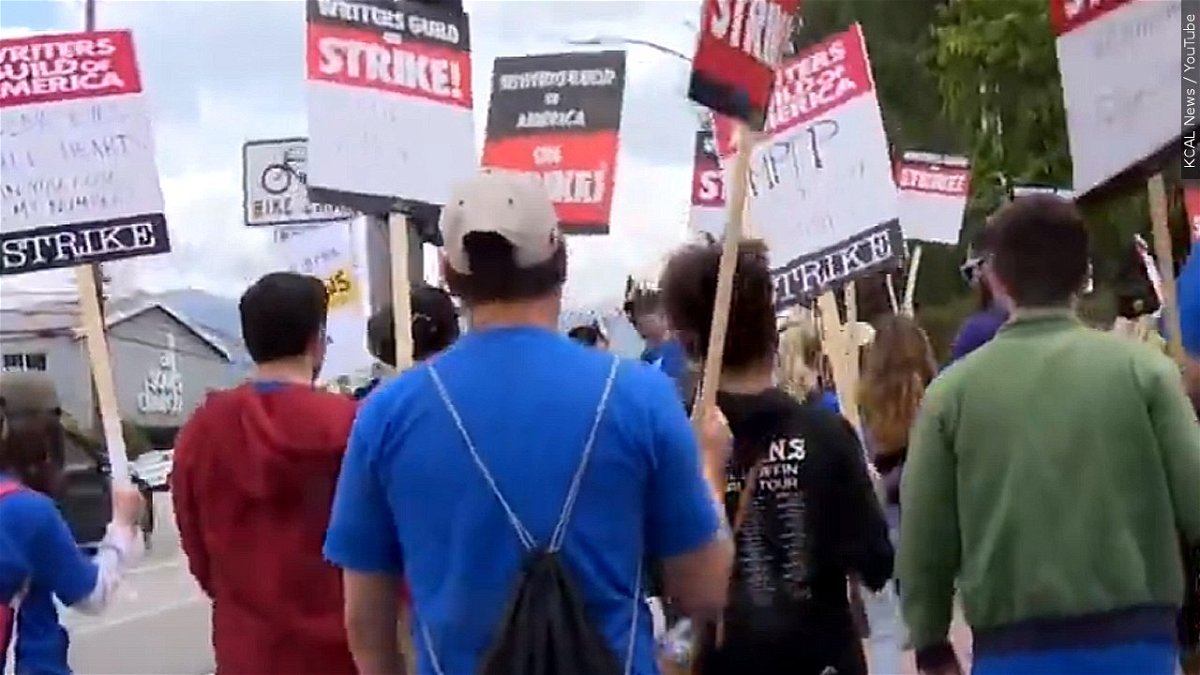WGA leaders back proposed labor deal, strike ends at midnight

Leaders of the Writers Guild of America endorsed a proposed contract agreement with Hollywood studios today, setting the stage for a ratification vote by union members, while also agreeing to officially end the writers' strike at 12:01 a.m. Wednesday.
"This allows writers to return to work during the ratification process, but does not affect the membership's right to make a final determination on contract approval,'' the WGA negotiating committee wrote in a message to union members. "There will be meetings for current members this week before the ratification vote begins."
The ratification vote by the roughly 11,500 members of the WGA is expected to be held Oct. 2-9.
The proposed three-year contract agreement with the Alliance of Motion Picture and Television Producers, which represents the studios, was announced Sunday night after five consecutive days of negotiating sessions, at least some of which were attended by the so-called "Gang of Four" group of top studio executives -- Netflix's Ted Sarandos, Disney's Bob Iger, Universal's Donna Langley and Warner Bros/Discovery's David Zaslav.
With the boards of the WGA's East Coast and West Coast branches endorsing the deal Tuesday, the union also released the first detailed overview of the agreement, which includes stepped increases of minimum salaries which will jump by 5% upon ratification, 4% in May 2024 and 3.5% in May 2025. There are also increases in health and pension contributions.
The proposed contract also includes restrictions on studios' use of artificial intelligence, barring AI from writing or rewriting literary material and preventing AI-generated material from being considered source material, meaning it can't "undermine a writer's credit."
The proposal also includes a new residual formula for streaming program that boosts pay for particularly successful programs. According to the guild, shows or films "that are viewed by 20% or more of the service's domestic subscribers in the first 90 days of release, or in the first 90 days in any subsequent exhibition year, get a bonus equal to 50% of the fixed domestic and foreign residual, with views calculated as hours streamed domestically of the season or film divided by runtime.''
Also included are increases in pay for writers employed on TV series, along with employment guarantees for set numbers of writers on series, based on the number of episodes being produced.
A full summary prepared by the WGA of the contract proposal is online at https://www.wgacontract2023.org/the-campaign/summary-of-the-2023-wga-mba.
The WGA went on strike on May 2, and they were joined on picket lines in mid-July by the SAG-AFTRA actors' union, effectively grinding all production to a halt.
With the WGA strike seemingly resolved, the focus is expected to shift to negotiations with actors, likely using the writers' union contract proposal as a template on some issues -- although actors are seeking steeper increases in salary. There has been no official word of any planned resumption of negotiations between SAG-AFTRA and AMPTP.
The AMPTP previously reached a contract agreement with the Directors Guild of America.
Although the WGA strike will officially end at 12:01 a.m. Wednesday, it was unclear how quickly writers would actually return to work. Some may continue to honor the SAG-AFTRA picket lines.
When the tentative contract agreement was announced Sunday, the WGA negotiating committee officially suspended the union's picketing activities.
"Instead, if you are able, we encourage you to join the SAG-AFTRA picket lines this week,'' the committee told members.
The committee also hailed the resolve of union members during the lengthy work stoppage.
"What we have won in this contract -- most particularly, everything we have gained since May 2nd -- is due to the willingness of this membership to exercise its power, to demonstrate its solidarity, to walk side-by-side, to endure the pain and uncertainty of the past 146 days,'' WGA negotiating team members wrote in a message to union members Sunday night. "It is the leverage generated by your strike, in concert with the extraordinary support of our union siblings, that finally brought the companies back to the table to make a deal."
"We can say, with great pride, that this deal is exceptional -- with meaningful gains and protections for writers in every sector of the membership.''
News of the agreement was hailed by local leaders and even President Joe Biden, who applauded both sides for reaching a tentative deal "that will allow writers to return to the important work of telling the stories of our nation, our world -- and of all of us."
"This agreement, including assurances related to artificial intelligence, did not come easily,'' Biden said in a statement. "But its formation is a testament to the power of collective bargaining. There simply is no substitute for employers and employees coming together to negotiate in good faith toward an agreement that makes a business stronger and secures the pay, benefits, and dignity that workers deserve. I urge all employers to remember that all workers -- including writers, actors, and autoworkers -- deserve a fair share of the value their labor helped create."
